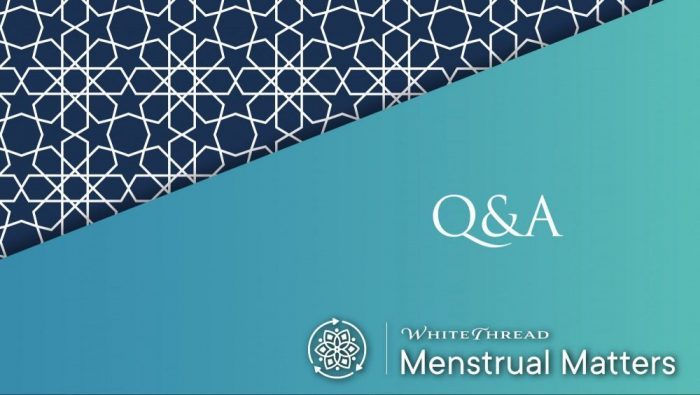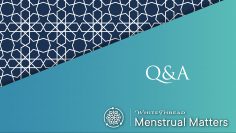
Rulings of an Excused Person
Assalaamualikum,
I hope that You are all well, in sha Allah.
I have questions related to the Mazoor of the Uzr Istihadah, please:
– I learnt from the Mastering the Fiqh of Menstruation Course of Whitethread Institute, that for a Mazoor’s attaining of an Invincible Wudu from their Uzr, they must have made that particular Wudu with the intention of seeking purity from that Uzr that they are Mazoor from specifically. Is this correct please?
If this is correct, then my question is can one have numerous intentions for their Wudu as a Mazoor? For example, Sara has Istihadah and is Mazoor from this, she makes a Wudu for each Salaah time but also tends to urinate/relieve herself before doing this; therefore the Wudu she performs thereafter is due to both seeking purity from her Uzr at the entrance of a new Salaah time and also to attain purity after urinating – Is this type of Multiple Intentions valid in allowing her to have the Mazoor Invincible Wudu?
– If one is Mazoor from Istihadah and needs to perform Wudu different times in a certain Salaah Time, due to natural occurrences such as flautenance and needing to urinate etc, does she have to remove the blood, via changing her sanitary towels each time she needs to refresh her Wudu in a single Salaah Time, or does she not need to?
– Please can You kindly detail the Ruling of a Mazoor praying with filth from the Uzr; what is excused? For Istihadah inparticular, and please advise on how to practically follow the Ruling?
My understanding is that if one has a Dirham’s size or more of blood, she ONLY needs to change the sanitary towel if the blood would not resoil for the time it takes to perform the Salaah. If she has less than a Dirham’s size of blood, then she does not need to remove it before praying as it is excused – Is this correct please?
Can You also kindly advise on the following, related to the 3rd question. If one has to change their blood soiled sanitary towel prior to Salaah, is it sufficient to perform Istinjah, change sanitary towel and perform Wudu and then seek to perform Salaah thereafter? Or does one have to change the sanitary towel immediately before Salaah, as with Istihadah this can sometimes not be possible due to the lack of privacy as it requires exposure of the private parts?
Also please, with this Ruling of changing the blood soiled sanitary towel prior to Salaah when one is required to, then does one have to do this prior to the performance of each separate Salaah, e.g; such as before the Sunnah of Dhuhr, then Fardh of Dhuhr and thereafter Sunnah of Dhuhr separately?
ThankYou for all of Your help. In Sha Allah, I hope the questions are clear and if not please recontact.
JazakAllahu Khairaa
Answer
In the name of Allah, the Inspirer of truth
The condition for validity of an ‘Invincible’ ablution (wudu) of an excused person (ma’dhur) is that it was made because of the excuse (‘udhr) and not for any other reason. The wudu will not break by occurrence of the same excuse. However, if a different nullifier occurs, wudu will be invalidated and a fresh wudu will be required.
If wudu is made for another reason, such as passing gas and the excuse starts after, it will break even though the salat time has not ended. This is because it was not made to purify against the excuse.
For example, if an excused person made wudu at the beginning of Maghrib to purify against passing gas and after making wudu the ‘udhr did not occur, he/she is allowed to pray with that wudu as long as they remain pure. However, if he/she did not pray Maghrib and the ‘udhr returns, the wudu will be invalidated and a new wudu will be needed to complete the prayer. Now, this wudu will not break due to the reoccurrence of the same ‘udhr. It will only be invalidated by the occurrence of a nullifier other than the excuse or by the expiry of the current prayer time. Please refer to this recording for further detail.
In situations where wudu is required from multiple nullifiers, the primary intention when making wudu should be for her excuse. Wudu must be made after the excuse has occurred at least once (as discussed in the above example). This will ensure that wudu is not broken if the excuse returns during that prayer time. Also, by making wudu one is automatically purified from other nullifiers such as relieving oneself.
For an excused person, it is obligatory to clean any impurities from one’s body/clothes, if they will remain clean during wudu and salat. For example, a woman who is suffering from istihada and has qualified as a ma’dhur believes that she will be able to make wudu and pray before the blood returns; in this case, the existing impurity should be removed before praying. One must try to pray in a perfect state as much as possible.
However, if it is likely that the impurity will return before wudu and salat are complete, she can pray in that state. It is not necessary for her to change sanitary towels before each unit of prayer; at the beginning of salat is sufficient.
If she is able to stop the flow of blood, it is necessary for her to do so. She may use a kursuf or interlabial pad to block the bleeding so that her wudu remains intact. If by sitting down blood does not flow, then she should sit and pray.
And Allah knows best.



